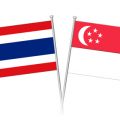SingaporeCompanyIncorporation.sg, a portal for company formation services, has today published a comparative report on doing business in Singapore and Hong Kong. The report aims to help companies determine which economy offers a better business ecosystem for growth.
The report referred to data from World Bank’s 2014 ‘Ease of Doing Business’ report and World Economic Forum’s Global Competitiveness 2013 – 2014 as well as 2014 Global Enabling Trade reports. It measures five indicators, namely workforce, intellectual property protection, foreign investment friendliness, corporate tax rate, and company incorporation. The findings are summarized below.
Foreign investment friendliness
In order to encourage investors to inject capital into businesses, economies must have regulations to protect them. In the Doing Business report, the Strength of Investor Protection Index measures the transparency of transactions, the shareholders’ ability to sue officers and directors for misconduct and liability for self-dealing. Singapore scored 9.3 out of 10 while Hong Kong came in close with a score of 9.0. This placed Singapore in the 2nd position and Hong Kong third worldwide in the category of protecting investors.
In addition, cross-border investments are supported by sound trade policies and inter-regional trade agreements. According to the 2014 Global Enabling Trade report ranked Singapore at the top position and Hong Kong in the second due to their trade friendly regulations and business ecosystems.
Furthermore, Singapore is placing greater focus on compliance with the Singapore financial reporting standards (SFRS) as well as regulations like FATCA and BASEL III. These will continue to safeguard the interests of genuine investors.
Intellectual property protection
Other than foreign investment friendliness, protection of Intellectual Property (IP) rights helps boost investor confidence. According to the Global Competitiveness Report (GCR), Singapore stands second in the world and first in Asia for having the best IP protection. Hong Kong was ranked at 10th position.
In Singapore, the costs related to the acquisition and in-licensing of IP rights are eligible for tax incentives under the PIC (Productivity and Innovation Credit) scheme. Eligible private limited companies can get either a 400% corporate tax rebate or a cash payout worth 60% of the costs when they do so in Singapore.
Workforce
The GCR ranked both Singapore and Hong Kong well for labour market efficiency. GCI ranked Singapore first while Hong Kong was ranked third. Singapore scored very well in 9 out of 10 indicators while Hong Kong scored well in 7 indicators. However, in terms of redundancy costs, reliance on professional management and women’s participation in the labour force, Hong Kong did not score as well.
According to the GCR, both Singapore and Hong Kong have labour related challenges which were cited as problematic factors for doing business. In Hong Kong, it was an inadequately educated workforce. In Singapore, it was restrictive labour regulations. Both cities are nonetheless popular destinations for professionals.
Singapore or Hong Kong?
Hong Kong has always been a close competitor of Singapore in terms of attracting businesses from across the globe. Hong Kong has many strengths, some of which supercede Singapore. These include dealing with construction permits, getting electricity, paying taxes, and enforcing contracts.
However, Singapore has other strengths which trump Hong Kong’s too. Singapore has excellent infrastructure, lower traffic congestion and air pollution, a highly educated workforce and easy property registration procedures. The GCR also cited the insufficient capacity to innovate, inefficient government bureaucracy, inflation, and policy instability as impediments to doing business in Hong Kong.
“International businesses find it difficult to choose between Singapore and Hong Kong. Both Singapore and Hong Kong are strong financial and wealth hubs in Asia and both have efficient and business-friendly policies. Hong Kong functions as an ideal financial center for companies who want to be closer to mainland China. Singapore, on the other hand, is suitable jurisdiction to set up regional headquarters or to relocate with a family. This is because other than lower air pollution, health and education facilities offered in Singapore can better cater to the needs of families,” commented Ms. Cheryl Lee, Operations Manager at SingaporeCompanyIncorporation.sg.
To view the full report, please click here.
Related Reading » Singapore Company Incorporation





